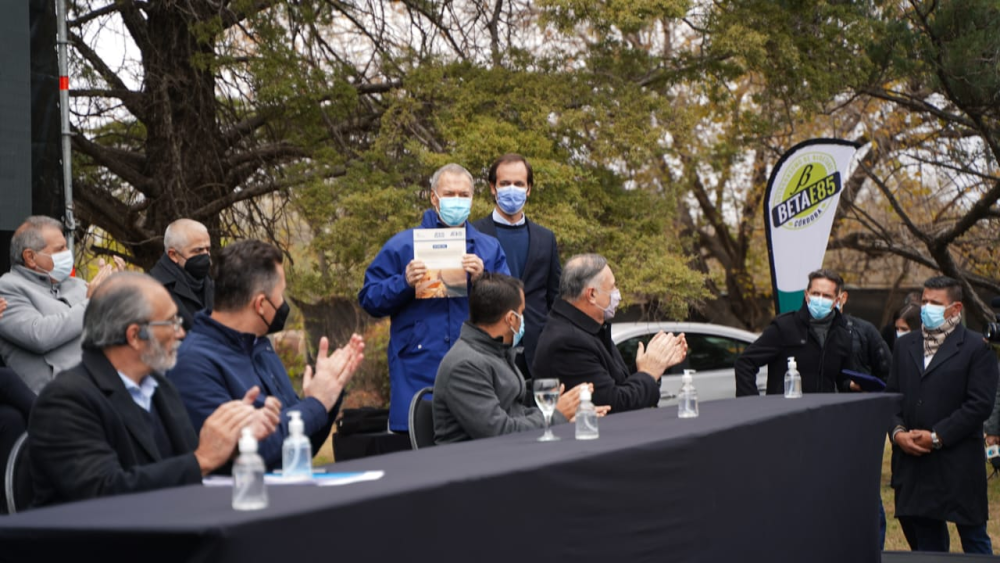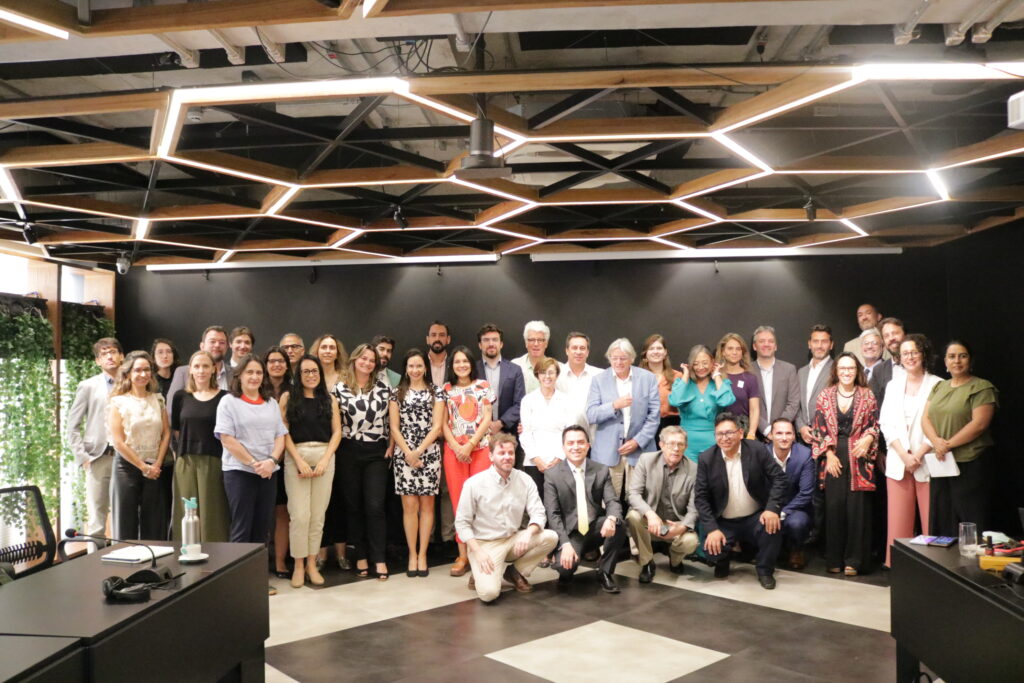El documento, en forma de libro, fue entregado al gobernador Juan Schiaretti en un acto público realizado en la capital provincial con la presencia de autoridades, legisladores, representantes de cámaras y entidades del sector privado productor y de la academia.

Córdoba, Argentina, 14 de junio de 2022 (IICA). El desarrollo de los biocombustibles es una gran oportunidad de desarrollo para la provincia argentina de Córdoba, en un contexto en el que se espera en las próximas décadas un fuerte aumento de su consumo a nivel mundial para cumplir las metas ambientales. Así lo afirma y lo justifica el extenso trabajo titulado “Desarrollo bioeconómico a través de los biocombustibles en la provincia de Córdoba: Aportes para la formulación de un plan para la aplicación de la ley provincial de biocombustibles y bioenergías”, realizado por un equipo técnico del Instituto Interamericano de Cooperación para la Agricultura (IICA).
El documento, en forma de libro, fue entregado al gobernador Juan Schiaretti en un acto público realizado en la capital provincial con la presencia de autoridades, legisladores, representantes de cámaras y entidades del sector privado productor y de la academia.
Con esta investigación, el IICA realiza un aporte concreto en el marco de la sanción, en 2020, de la ley provincial de promoción y desarrollo para la producción y consumo de biocombustibles y bioenergías en Córdoba. Esta norma abre oportunidades y desafíos para promover el desarrollo bioeconómico a través del uso inteligente y masivo de los biocombustibles líquidos y biogás. El trabajo ofrece recomendaciones para la elaboración de un plan de desarrollo para el éxito de la ley y el aprovechamiento de las oportunidades que se presentan desde el punto de vista económico, ambiental y social.
El documento, de más de 250 páginas, con la participación de reconocidos expertos, señala que el desarrollo de los biocombustibles constituye un importante motor que permite agregar valor al agro y diversificar la producción, a la vez que reemplazar combustibles fósiles, disminuyendo las emisiones de gases de efecto invernadero. Para la Argentina, ésta es una de las principales oportunidades que brinda la bioeconomía, visión que impulsa la industrialización inteligente a partir del uso de recursos biológicos, convirtiéndolos en productos con valor agregado, como bioproductos, bioenergías y servicios.
“Esta jornada sin dudas es importante, no solo por el presente, sino por el futuro de nuestra provincia, de nuestra región central, y de toda la Argentina”, señaló el gobernador Juan Schiaretti, quien recibió la investigación del IICA en el contexto del encuentro “Córdoba sostenible y biocombustibles”, una de las iniciativas que la provincia impulsa para avanzar en la migración de la flota pública hacia biocombustibles y una nueva matriz energética, local y sostenible.
Córdoba, ubicada en el centro de la Argentina, es una de las principales provincias agrícolas del país, por lo que se destaca la abundante oferta de soja y maíz, materias primas para la producción de biocombustibles, tanto de biodiésel como de bioetanol.
Argentina es el principal exportador de aceite de soja del mundo y Córdoba tiene 102 empresas de diferentes tamaños, con una capacidad instalada para procesar 7,3 millones de toneladas de la oleaginosa al año. En el caso del maíz, el país se posicionó como el segundo mayor exportador en el 2020 y Córdoba es la principal productora, con el 36% de la producción nacional el año pasado. En el plano industrial, Córdoba es líder en la elaboración de bioetanol de maíz, ya que concentra el 69% de la capacidad instalada de producción.
“La capacidad instalada de producción de ambos biocombustibles es superavitaria, generando oportunidades de desarrollo de nuevos mercados, tanto a nivel interno como externo”, señala el trabajo. Los porcentajes de mezcla obligatorio de los combustibles líquidos a nivel nacional están fijados actualmente en el 12% en el caso del bioetanol y en el 5% en el del biodiesel pero pueden ser elevados por la Secretaría de Energía de la Nación en cualquier momento. En el libro se estudian rutas de acción y experiencias similares en Brasil, Suecia, Indonesia, Francia y Estados Unidos.
En el acto participó el Director General del IICA, Manuel Otero, a través de un video enviado desde la sede central del organismo, en Costa Rica.
“La provincia de Córdoba es dueña de un excelente posicionamiento para la bioeconomía en general y los biocombustibles en particular, con foco en el bioetanol, en el biodiesel y el biogás”, señaló Otero, quien agregó: “El consumo a mayor escala de bioetanol, con mezclas superiores al 12%, y de más del 5% en biodiesel, supone una serie de desafíos y oportunidades para esta provincia desde el punto de vista social, ambiental y económico, que tiene una proyección hacia el país y, por qué no al continente”.
“Esperamos que el trabajo sea de gran utilidad –concluyó- para el futuro que todos juntos tenemos que construir. Desde el IICA continuamos al servicio de la provincia de Córdoba, de la Argentina y de los países de las Américas para hacer aportes sustantivos al desarrollo sostenible, competitivo e inclusivo de nuestro continente”.
“Es altamente factible, y recomendable, expandir la producción de biocombustibles líquidos en Córdoba y también existe un gran potencial para el biogás”, afirmó, por su lado, Agustín Torroba, Especialista del IICA en Biocombustibles y Bioenergías y coordinador de la investigación, quien participó en un panel de debate sobre el documento, junto a Patrick Addam, Director Ejecutivo de la Cámara de Bioetanol de Maíz, y Gustavo Idígoras, presidente de la Cámara de la Industria Aceitera de la República Argentina) y el Centro Exportador de Cereales (CIARA-CEC).
“El trabajo demuestra que a través de la masificación del consumo de los biocombustibles líquidos hay un potencial destacado para agregar valor en origen, generar empleos locales, sustituir importaciones de combustibles fósiles, generar desarrollo crecimiento y desarrollo regional y expandir inversiones ya existentes”, afirmó Torroba.
El experto agregó que los biocombustibles tendrán un rol preponderante en la descarbonización del sector transporte a nivel global y también regional y local.
Más información:
Gerencia de Comunicación Institucional
comunicacion.institucional@iica.int










